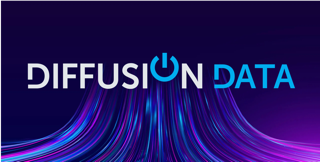In today’s world, instant gratification has fueled a surge in interest and comfort among individuals looking to engage in retail trading and investing. With a plethora of trading platforms and a wide array of research and analytics data providers available, individuals now have the opportunity to trade in almost any market from anywhere across the globe. The popularity of cryptocurrency and digital coins as asset classes, coupled with the rise of exchanges like Coinbase and Binance, has not only paved the way for the adoption of trading but has also redefined traditional investment avenues such as stocks and bonds.

Predicted to reach a market share of $13 billion by 2030, the retail trading platform industry is on a remarkable growth trajectory. Complementing these platforms are numerous ancillary businesses that offer real-time insights, both fundamental and technical analysis, as well as up-to-the-second market data. Investors worldwide are embracing these sophisticated tools to make informed real-time trading and investment decisions. Take, for instance, an Ireland-based online trading platform that empowers retail investors to trade stocks across global markets from any location. Currently serving 400,000 customers globally and executing trades valued at $2-3 billion daily, this platform is a testament to the industry’s expansion. Larger providers with even higher customer counts are also in the fray. High street banks such as Lloyds and Barclays in the UK, for instance, offer retail trading platforms primarily focused on local markets, whilst the likes of eToro, Trading212, IG, Interactive Brokers etc. provide access to markets worldwide.
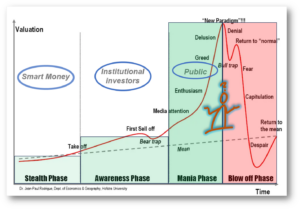
However, this surge in retail trading accessibility has its drawbacks, particularly concerning individuals who lack the necessary skills and knowledge. As a response to this, most trading platforms now come with disclaimers that underscore the high risk associated with trading. Regulators have begun to introduce controls to limit access to risky products like leveraged trading. Nonetheless, the era of instant gratification often dissuades individuals from dedicating the essential time required for learning, often leading to information overload. The majority of retail investors and traders find it challenging to effectively manage the Risk-to-Reward Ratio and Win Rate, vital for minimizing losses and maximizing gains.
Across the board, both retail and professional traders rely heavily on charts as essential tools for decision-making. Charts provide valuable insights into the current and historical performance of stocks before investment decisions are made.
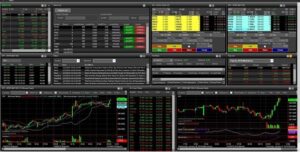
It’s clear that trading without a well-defined strategy can be exceedingly risky. Charts and indicators offer the much-needed clarity to develop strategies and make informed entry and exit choices.
Consequently, access to reliable and robust stock charting tools is paramount. Many traders even turn to specialized charting tools like TradingView Charts in conjunction with their platform’s native options. However, charts heavily rely on a real-time stream of prices and indicators to be truly effective. This presents a challenge: a constant stream of high-velocity data can strain internet bandwidth, especially when shared at home or on-the-go using mobile devices. A retail investor trading stocks via their home broadband, for instance, must contend with both the quality of their connection and the activities of other users consuming bandwidth for streaming video, online gaming, and video conferencing.
This is where Delta Streaming technology steps in, redefining the game for both retail traders and platform providers alike. By reducing data size and bandwidth needed to transmit prices to traders’ desktops or apps by up to 90%, Delta Streaming significantly enhances the performance and reliability of trading platforms. This means real-time charts and information remain
accessible, even during periods of high market volatility or bandwidth congestion. The smaller data sizes also empower traders to subscribe to multiple charts and indicators simultaneously, allowing for a comprehensive market overview before executing trades.
Moreover, the benefits extend to platform providers. Reduced data transmission results in lower bandwidth costs and an overall improved user experience for customers. Plus, the platform’s capacity to serve more concurrent users is amplified due to the lower data demand.
So, What Exactly is Delta Streaming?
Within the context of a Publish-Subscribe (PubSub) platform, wherein consumers subscribe to data streams via message topics or channels, Delta Streaming revolutionizes by encoding value changes and transmitting only the differences between old and new values instead of the whole value. For structured data, updates often impact only specific portions of the data, with the majority remaining unchanged. Imagine a structured Price Data Stream for a particular instrument as used in a trading chart. In this case, any changes are primarily centered around the price and time of the event. Transmitting only the alterations through a delta stream can lead to a substantial 90% reduction in network bandwidth usage. Importantly, this approach accommodates a faster rate of publishing updates across the network. When the delta is received, consumers merge it with the previous value to generate the new value.
Enter Diffusion: The Transformational Delta Streaming Platform

Enter Diffusion, an Advanced Delta Streaming platform employing patented technology to determine structural differences between any type of consecutive payloads at the binary level without decoding, making it fast and secure. The binary delta, which is a fraction of the size of the original value is then transmitted to consumers. This also means any complexity of delta calculation and streaming is transparent to the applications which publish or consume data, making it easy to adopt. The consumers then seamlessly reconstruct the new payload by amalgamating the previous payload and the binary delta. This method empowers high-velocity data transmission over networks with minimal bandwidth usage. As a result, Diffusion’s technology is poised to reshape the traditional approach to transmitting vast amounts of data across networks, offering a solution to the high costs and capacity limitations faced by the industry.
Advantages for Retail Trading Platform Provider
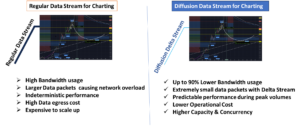
trading platform providers stand to reap substantial benefits from Diffusion’s innovation:
1. Reduced Bandwidth Usage and Costs: By cutting down bandwidth usage by up to 90%, Diffusion helps platform providers significantly minimize operational costs while maintaining optimal performance.
2. Enhanced Performance Across Networks: Diffusion ensures platform performance remains robust even in congested or unreliable network environments, guaranteeing traders access to real-time data when it matters most.
3. Improved Capacity and User Experience: With reduced data demand, platforms can serve more users concurrently, translating into higher capacity and an enhanced user experience.
The Power of Diffusion PubSub Platform
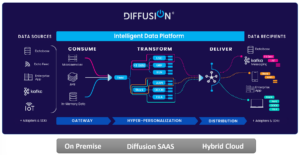
Diffusion’s robust feature set serves as a catalyst for the development of scalable, real-time data-driven applications. Its ability to manage high volumes of streaming data in real-time, coupled with its low-code transformation capabilities, hierarchical data stream modelling, and unmatched delta streaming, sets Diffusion apart from the competition. Financial institutions have harnessed Diffusion to modernize APIs and deliver expansive retail trading platforms, while exchanges utilize it to provide real-time price updates to their extensive client base.
In conclusion, the rise of retail trading platforms has transformed the landscape of investing and trading. However, the challenges of managing data flow and ensuring real-time access to vital information have underscored the need for innovative solutions. Delta Streaming, exemplified by Diffusion, is poised to reshape the industry by significantly improving performance, reducing costs, and enhancing the overall user experience. As the market continues to evolve, technology like Diffusion is set to play a pivotal role in revolutionizing the way we approach retail trading.






